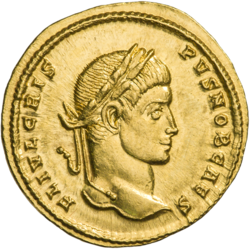
Back كريسبوس (شخصية) Arabic Encrespu AST Крысп Byelorussian Крисп Bulgarian Crispus Breton Flavi Juli Crisp Catalan Crispus German Κρίσπος Greek Crispo Spanish Krispo Basque
This article needs additional citations for verification. (July 2008) |
| Crispus | |||||
|---|---|---|---|---|---|
| Caesar (1 March 317 - 326) | |||||
 | |||||
| Born | c. 300 Pola, Istria | ||||
| Died | 326 AD (aged c. 26) Pola, Istria | ||||
| Spouse | Helena[1] | ||||
| Issue | 1 | ||||
| |||||
| Dynasty | Constantinian | ||||
| Father | Constantine I | ||||
| Mother | Minervina | ||||
| Religion | Greco-Roman religion | ||||
Flavius Julius Crispus (/ˈkrɪspəs/; c. 300 – 326) was the eldest son of the Roman emperor Constantine I, as well as his junior colleague (caesar) from March 317 until his execution by his father in 326. The grandson of the augustus Constantius I, Crispus was the elder half-brother of the future augustus Constantine II and became co-caesar with him and with his cousin Licinius II at Serdica, part of the settlement ending the Cibalensean War between Constantine and his father's rival Licinius I. Crispus ruled from Augusta Treverorum (Trier) in Roman Gaul between 318 and 323 and defeated the navy of Licinius I at the Battle of the Hellespont in 324, which with the land Battle of Chrysopolis won by Constantine forced the resignation of Licinius and his son, leaving Constantine the sole augustus and the Constantinian dynasty in control of the entire empire. It is unclear what the legal status of the relationship Crispus's mother Minervina had with Constantine was; Crispus may have been an illegitimate son.
Crispus's tutor in rhetoric was the Late Latin historian of Early Christianity Lactantius. After his elevation to imperial rank, at which point he was also entitled princeps iuventutis ("Prince of Youth"), the Latin rhetorician Nazarius composed a panegyric preserved in the Panegyrici Latini, which honoured Crispus's military victories over the Franks in c. 319. Crispus was three times Roman consul, for the years 318, 321, and 324.
According to the Latin histories of Ammianus Marcellinus and Aurelius Victor, after a trial whose real circumstances are mysterious, Constantine executed Crispus at Pola (Pula) in 326. His stepmother Fausta was also put to death, and the Late Greek historian Zosimus and the Byzantine Greek writer Joannes Zonaras wrote that Constantine had accused Crispus of incest with her. After his death, Crispus was subjected to damnatio memoriae.
- ^ Jones, Martindale & Morris, p. 409.
- ^ Jones, Martindale & Morris, p. 233.
© MMXXIII Rich X Search. We shall prevail. All rights reserved. Rich X Search